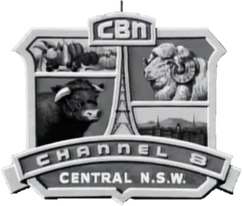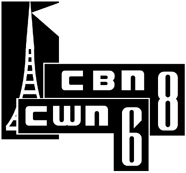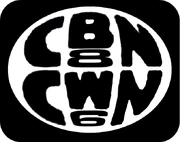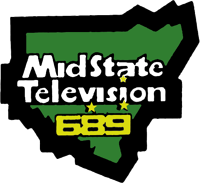Eddieblake (talk | contribs) No edit summary |
Eddieblake (talk | contribs) No edit summary |
||
| Line 45: | Line 45: | ||
[[File:Cbncwn1973.png|thumb|center]] |
[[File:Cbncwn1973.png|thumb|center]] |
||
| − | == Television |
+ | == Television 8-6== |
=== 1977–1980 === |
=== 1977–1980 === |
||
| Line 51: | Line 51: | ||
In 1977 both CBN-8 and CWN-6 were branded on-air as '''Television 8-6'''. |
In 1977 both CBN-8 and CWN-6 were branded on-air as '''Television 8-6'''. |
||
| − | |||
| − | == Television 8-6 == |
||
=== 1980–1981 === |
=== 1980–1981 === |
||
Revision as of 06:53, 15 May 2020
This page only shows primary logo variants. For other related logos and images, see:
|
| 1962–1963 | 1963–1965 | 1965–1968 | 1968–1973 | 1973–1977 | 1977–1980 | 1980-1981 |
| 1973–1975 | 1975–1980 | 1980–1981 | 1981–1988 | 1964–1966 | 1966–1985 | 1971–1985 |
| 1985–1988 | 1988–1996 | 1990–2001 | 2001–2011 | 2011–present | ||
CBN-8 Central NSW
1962–1963
CBN-8 Central NSW began transmission on 17 March 1962 with a relay station setup in 1965 at Lithgow on VHF-6. The callsign stood for Country Broadcasting Services Limited New South Wales. The station was licensed to Country Broadcasting Services (later Country Television Services).
1963–1965
CBN/CWN
1965–1968
CWN-6 Dubbo began transmission on 1 December 1965 with a relay station setup in 1968 at Mudgee on VHF-9. The callsign stood for Central Western Slopes New South Wales. The CBN-8 studios in Orange provided program output for CWN.
1968–1973
In 1969, relay stations were setup at Cobar and Kandos/Rylstone on VHF-10. This was followed in 1972 by relay stations VHF-4 at Portland/Wallerawang and VHF-11 at Bathurst.
1973–1977
Television 8-6
1977–1980
In 1977 both CBN-8 and CWN-6 were branded on-air as Television 8-6.
1980–1981
Television 6-8-9
1973–1975
Facing financial difficulties, it was decided in 1973 to enter into a joint programming agreement with Griffith station MTN-9, resulting in the formation of the Television 6-8-9 Network which combined the logos of CBN/CWN and MTN-9.
1975–1980
1980–1981
MidState Television
1981–1988
In March 1981, the network was rebranded MidState Television 6-8-9. In 1987, CBN/CWN were purchased by Ramcorp Ltd.
RVN-2 Wagga-Wagga
1964–1966
RVN-2 Wagga-Wagga began transmission on 19 June 1964. Translators would be later set up at Young on VHF-6, Wagga City on VHF-11 and Tumbarumba on UHF-69. The callsign stood for Riverina New South Wales.
1966–1971
RVN-AMV
1971–1985
Facing financial difficulties, both RVN-2 Wagga-Wagga and AMV-4 Albury-Wodonga merged to form The Riverina and North East Victoria Television Service in 1971. The station would be known on-air as RVN-AMV. Programming for both stations would remain seperate until 1976 when transmission would be centralised in Wagga-Wagga.
The Prime Network RVN-AMV
1985–1988
In October 1987, Midstate Television was bought out by Ramcorp Ltd. It was soon merged with its other stations RVN/AMV and NEN/ECN.
Prime Southern NSW
1988–1996
In May 1988, CBN/CWN were merged with RVN/AMV to form Prime Television. When aggregation occurred in Southern NSW on 30 March 1989, both CBN and CWN were merged into one station CBN, branded on-air as Prime Television. That same day CBN expanded into Canberra (UHF-34) and Illawarra/Regional Wollongong (UHF-65). By 1991, the Wagga-Wagga and Orange licenses were merged into one with RVN taking on the CBN callsign.
1990–2001
2001–2011
Prime7 Southern NSW
2011–present
Television in New South Wales and the Australian Capital Territory
|
|---|
| Sydney ABN (ABC TV) | ATN (Seven) | TCN (Nine) | TEN (10) Northern NSW Southern NSW and ACT Griffith and MIA Broken Hill Remote Areas |



















